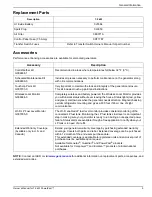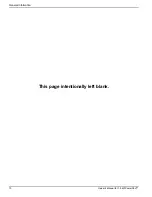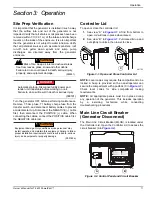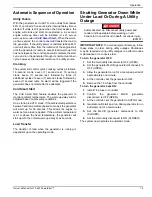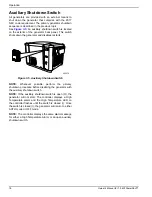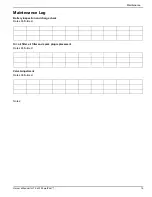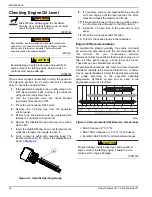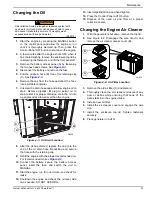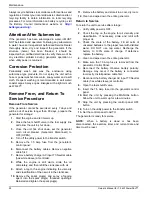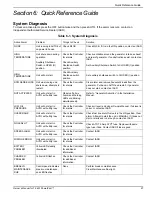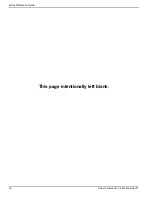
Maintenance
Owner’s Manual for 7.5 kW PowerPact™
23
7.
Turn the pivot ball stud (B) while checking clearance
between the rocker arm (C) and the valve stem (D)
with a feeler gauge (E). Correct clearance is 0.002–
0.004 in. (0.05–0.1 mm).
NOTE:
Hold the rocker arm jam nut in place as the pivot
ball stud is turned.
8.
When valve clearance is correct, hold the pivot ball
stud in place with the wrench and tighten the rocker
arm jam nut. Tighten the jam nut to 174
in-lbs
(19.68 Nm) torque. After tightening the jam nut,
recheck valve clearance to make sure it did not
change.
9.
Install new valve cover gasket.
10.
Install the valve cover. Tighten fasteners in a cross
pattern, torquing to 35–62
in-lbs
(4–7 Nm).
NOTE:
Start all four screws before tightening or it will
not be possible to get all the screws in place. Make sure
the valve cover gasket is in place.
11.
Install the rubber plug into the fan screen.
12.
Install the spark plug and attach the spark plug wire.
13.
Install the back panel. Ensure that the alternator
intake bellow is captured by the frame on back
panel securely with out any kinks. Install enclosure
top lid. Tighten all fasteners securely.
14.
Place the generator in AUTO.
Battery Maintenance
The battery should be regularly inspected per the
:
1.
With the generator shut down, lift the lid and
remove the front panel and the battery access
panel.
2.
Inspect the battery posts and cables for tightness
and corrosion. Tighten and clean as necessary.
3.
Check the battery fluid level of unsealed batteries,
and if necessary, fill with distilled water only. DO
NOT use tap water. Also, have the Independent
Authorized Service Dealer or a qualified Service
Technician check the state of charge and condition.
Strictly observe the following precautions when working
on batteries:
•
Remove the 7.5 Amp fuse from the generator control
panel.
•
Remove all jewelry (watches, rings, metal objects,
etc.)
•
Use tools with insulated handles.
•
Wear rubber gloves and boots.
•
Do not place tools or metallic objects on top of the
battery.
•
Disconnect the charging source by pulling T1 fuse in
the transfer switch prior to connecting or
disconnecting battery terminals.
•
Wear full eye protection and protective clothing.
•
Where electrolyte contacts the skin, wash it off
immediately with water.
•
Where electrolyte contacts the eyes, flush
thoroughly and immediately with water and seek
medical attention.
•
Wash down spilled electrolyte with an aid
neutralizing agent. A common practice is to use a
solution of 1 pound (500 grams) bicarbonate of soda
to 1 gallon (4 liters) of water. The bicarbonate of
soda solution is to be added until the evidence of
reaction (foaming) has ceased. The resulting liquid is
to be flushed with water and the area dried.
•
DO NOT smoke when near the battery.
•
DO NOT cause flame or spark in the battery area.
•
Discharge static electricity from the body before
touching the battery by first touching a grounded
metal surface.
(000162)
WARNING
Explosion. Do not dispose of batteries in a fire. Batteries
are explosive. Electrolyte solution can cause burns and
blindness. If electrolyte contacts skin or eyes, flush with water
and seek immediate medical attention.
(000137a)
WARNING
Explosion. Batteries emit explosive gases while charging.
Keep fire and spark away. Wear protective gear when
working with batteries. Failure to do so could result in
death or serious injury.
(000164)
WARNING
Electrical shock. Disconnect battery ground
terminal before working on battery or battery
wires. Failure to do so could result in death
or serious injury.
(000138a)
WARNING
WARNING
Environmental Hazard. Always recycle batteries at an
official recycling center in accordance with all local
laws and regulations. Failure to do so could result in
environmental damage, death or serious injury.
(000228)

